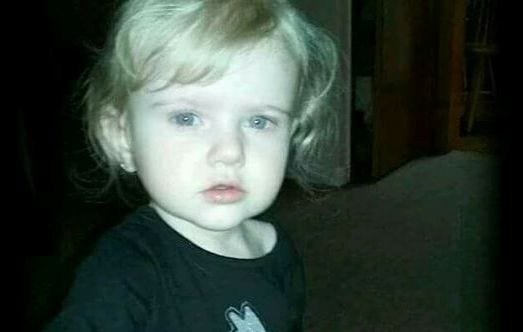Please Read: Kentucky Can't Stop Hurting and Killing Its Children
The state ranks first in the country for child abuse cases while budget cuts and a high turnover rate have made social work a nightmare.
In April 2017, a mother and her boyfriend are seen frantically trying to revive their 19-month-old daughter outside a gas station on a sparsely populated stretch of rural Kentucky.
Aria Blanton had stopped breathing from hitting her head on a chair, according to the boyfriend Robert Collins. He rushed her to Laura Blanton, the mother, who worked at the gas station in Menifee County.
A colleague of Laura saw Aria’s lifeless body and called 911 telling the dispatcher that “somebody has beat [sic] this baby to death.” The police arrived on scene and Aria was quickly lifted to University of Kentucky Children's Hospital in Lexington.
A police officer who responded to the call told a court that Aria “had severe bruising to her face and she was only wearing a diaper so I could see bruising on other parts of her body.” The boyfriend, however, insisted that “the baby was not hurt that bad” that required a visit to the hospital.
Doctors at Kentucky Children’s Hospital discovered the true extent of her injuries. Aria, who had blue eyes and blonde hair and weighed only 33 pounds, had a broken skull and a lacerated spleen. Her medical examination also revealed that she had been raped.
Aria passed away two days later and her death is one of several cases in Kentucky where children were so severely abused by their caregivers that an independent review panel classified them as “torture.”
Kentucky leads the nation in child maltreatment and the state has ranked first or second for over seven years. According to data released in 2018, there were 137,001 calls made alleging child abuse or neglect of which over 17,400 cases were substantiated by law enforcement officials. That means more than 23 kids per every thousand are victims of abuse which is twice the national average. Indiana is next with 19 cases for every 1,000 children.
Social services had to move as many as 10,000 children into foster homes in 2017 due to abuse and the independent Child Fatality and Near Fatality External Review Panel revealed that 51 children who died that year were abused. Another 56 were abused or neglected so badly that they were nearly killed.
“The tragic details illustrate that Kentucky is failing its children on almost every level — from basic parenting to reporting abuse to protecting children once they are under the state's care and supervision,” wrote Deborah Yetter, journalist for The Courier-Journal, whose yearslong investigation uncovered horiffic instances of child abuse.
Since 2017, at least seven cases were determined by the review panel as torture because it involved prolonged suffering caused by repeated or lengthy attacks which resulted in serious injury or death.
"We’re seeing not just more cases, but more severity. In the past year, we've seen more torture cases than we’ve ever had before,” Dr. Melissa Currie, chief of pediatric forensic medicine at the University of Louisville, told The Courier-Journal in 2019.
"I didn't want to turn her in," Aria's grandmother shared. "She is my daughter."
Tortured till death but no one reported it.
Aria’s grandparents repeatedly questioned their daughter about the marks on Aria’s face and body.
"We used to take photos of the bruises and tell her if the bruises didn't stop, we were going to call social services," Joyce Green, the child's grandmother, disclosed to authorities.
They acknowledged to the police two days after Aria’s death that they had failed to act, clearly devastated by her loss.
"You see this stuff on TV, and you don't think it will come to your house," said her grandfather, Jeff Green, who wept during the interview. "If I could turn back the clock one and a half months and know what could have happened …"
"I didn't want to turn her in," Aria's grandmother shared. "She is my daughter."
Laura Blanton, the mother, was sentenced for 20 years after she pleaded guilty to murder and criminal abuse and the trial for the boyfriend, Robert Collins, was set for November 2019. It is unclear what came out of it but he had pleaded not guilty.
State law mandates that suspected child abuse be reported to the police or social services but the review panel found similar failures in more than half the cases that involved physical abuse.
"If everybody thinks that (way), we're just going to continue to have kids die," added Currie. "We have to call it in.”
The case of 3-year-old Avery Hose of Frankfort is more jarring. He was tortured to death in 2017 but not without multiple missed opportunities to report his abuse.
Avery was removed from his home in early 2016 after a social worker found him living in inhumane conditions that amounted to neglect including insects, animal feces, mold and dirty dishes. He was allowed to return to his mother, Deanna Hose, later that year.
Avery suffered frequent bruises, cuts and injuries like a broken leg, usually when he was with his mother's live-in boyfriend, Randell Dennemann.
In June 2017, his mother and her boyfriend called EMS and told them that Avery had hit his head and was unresponsive. A medical examination at the UK Children's Hospital revealed that he had a fractured skull and broken ribs and bruises all over his body. Avery died soon after. The boyfriend was sentenced for 15 years for manslaughter and Avery’s mother is serving a five year sentence for wanton endangerment.
An investigation by social services found at least six people, most of them colleagues of Avery’s mother, that had noticed bruises on his body but did nothing. One person recalled seeing “bruises everywhere.”
"Sometimes you know something bad is happening but do not know what to do. Now it makes me sick, thinking I should have told someone,” said one of the people interviewed by social services.
Avery suffered a fracture to his leg in early 2017, an injurty common in child abuse cases. The mother and her boyfriend told a state social worker that he fell from jumping on the couch and the treating doctor accepted their explanation. The case was closed with no abuse found.
"We still have a long way to go in educating physicians in the emergency rooms about red flags for child abuse,” observed Currie.
"It's just horrible to read, why any human being would do this to another human being."
In May 2019, a father in Louisville punched his fist into the head of his 1-month-old son after losing in a video game. There are no indications that his son was crying and, according to police reports, Anthony Trice, 26, dropped the infant as he went into the kitchen to “make a bottle.”
De’Anthony Trice died two days later.
"You just want to cry," said Roger Crittenden, a retired Franklin Circuit Court judge and chairman of the review panel. "It's just horrible to read, why any human being would do this to another human being."
Drugs are more important than children
You would be forgiven to think that the father was under the influence of drugs. I have not seen any evidence to substantiate that but substance abuse is a factor in 70% of child abuse or neglect cases according to data compiled by social services. Officials at Jefferson County Family Court, which is working through the state’s largest number of child abuse, point out that the drug epidemic is ripping families apart. Reports of suspected child abuse have doubled between 2014 to 2019 mainly due to the opioid crisis.
"I think the opioid epidemic has just overwhelmed everyone. It’s like a tsunami... It's hard for everybody to stay afloat,” said Tara Hagerty, Jefferson County Chief Family Court Judge.
Abuse is the intentional infliction of harm on someone and neglect occurs when a caregiver fails to provide adequate care to the child, causing injury or illness. It is unclear if drugs made otherwise caring relatives abuse their children. Several studies, however, reveal that substance abuse leads to neglect.
Opioid is found in many cases but methamphetamine, an illegal stimulant that has resurged in Kentucky, was involved in some of the most extreme cases of child endangerment.
In the 2016 death of a 3-month-old boy, Travis Perkins, from Harlan County, his mother was high on meth and didn't realize that she hadn't cared for him in 12 hours. Perkins was pronounced dead on scene after sheriff’s deputies found him at the foot of a bed during a welfare check. His mother, Sierra Foster, pleaded guilty to reckless homicide.
In another case, a 6-month-old died while sleeping with his drug-impaired mother despite a court order barring her from seeing him.
"The need to get their drugs becomes more important than the child," said Dr. Christina Howard, chief of pediatric forensic medicine at University of Kentucky's UK HealthCare.
Where is the government?
Daniel Cameron, the Republican attorney general, joined a non-profit, Prevent Child Abuse Kentucky (PCAK) in April to raise awareness about sexual exploitation of children and announced more than $166,000 in grants to combat child abuse across the Commonwealth.
“Any incremental step that we can take whether it be related to sex exploitation or abuse specifically, we are going to do our part to be a constructive member of this conversation and try to move it all forward and push back against this scourge,” Cameron noted in a press conference this year.
Part of the urgency to address the crisis is fueled by the Coronavirus. School closures meant that one of the most effective sources to report suspected abuse was lost with one study disclosing that there was a 29% decrease in calls from March through June 2020. But now, with schools reopened throughout the state, officials like Kentucky Cabinet for Health and Family Services Secretary Eric Friedlander are warning of a coming increase in reports.
“That's why it's incumbent upon us to make sure that those supports that we can give are going to be available to our communities… the biggest philosophical change that we may have had recently is that… you get people to self-sufficiency through support.”


Gov. Andy Beshear, a Democrat, signed six bills in March to promote child safety and fight back against abuse and the drug crisis after he stated in a news conference in 2019 that children “are falling through the cracks.” Senate Bill 64 boosted penalties for child predators and House Bill 472 increases the statute of limitations for sexual abuse offenses against children from five to 10 years.
Any state response, however, can best be described as timid due to massive budget cuts. Beshear proposed $7 million to hire 76 new social workers in his budget plan this January but the Republican controlled state legislature eliminated it. Last year, he renewed calls for adding 350 social workers but the state House scaled it down to a 100.
Social work in Kentucky is no less than a nightmare. One social worker told The Courier-Journal that she was managing 80 cases before she quit. The state’s target is 18 cases per worker and national standards recommend 17.
In Jefferson County, which has the highest number of cases in the state, it is common to have one social worker administer 100 cases. According to a report by Community Based Services, the state’s social services agency, caseloads averaged around 30 per worker.
Patricia Pregliasco, 57, worked for the agency for 20 years, encouraged by the opportunity to make real change.
"I loved meeting these families who opened their homes," Pregliasco said. "I liked the older kids, being able to talk to them. These teens, they just wanted a stable home — and some communication with their biological families."
Frustrated by crushing caseloads and an absence of resources, Pregaliasco left the agency in 2019.
"My concern really is the people, the workers who are still there, who still feel like they can make a difference and do the job," Pregliasco added. "I admire them more than I can say."
Another reason that forces social workers to leave is the culture of blame when a case ends in an undesired outcome like a child getting killed or seriously injured.
"Our social workers operate in fear, in intimidation and in retaliation," said Eric Clark, who took over social services in 2018.
His administration is trying to change it to a “culture of safety” but observers note that the progress has been frustratingly slow.
In 2016, Kentucky had 1,134 social workers with 7,700 kids in foster care. The number of workers stayed relatively flat but the state now has close to 10,000 children living in foster homes, a record, and the coronavirus pandemic may increase that to a lot more.
Before the 2008 financial crisis and the range of budget cuts triggered by it, the state had over 1,600 social workers at a time when the number of children needing intervention was a lot lower. Former governor, Matt Bevin, did increase salaries but starting pay for entry level workers is still very low: between $35,000 to $40,000.
The ability to make a difference is not enough especially when workers fear for their safety. A 67-year-old social worker, Boni Frederick, was killed in 2006 by a couple when she was at their home to take their infant into her custody.
One Hardin County social worker, Priscilla Zuniga, left in 2018 after three years on the job when someone blew up her mailbox and started a fire. No one was charged but Zuniga was dealing with a difficult case where a judge had barred angry and abusive parents from seeing their children.
"You're taking somebody's life when you take their children,” Zuniga noted.
A 2017 study revealed that the agency’s turnover rate is 25% with a typical worker staying for four years.
Kentucky launched the federally funded Family First Prevention Act in 2019. That brought a lot more money into the agency to help with prevention efforts. The hope is that by preempting factors that lead to child abuse and neglect like substance abuse and mental illness, the population of foster children will come down thereby relieving pressure on social workers and advocates are optimistic about the act’s potential.
"The big thing that Family First does in my mind is that it incentivizes states to do the right thing," said Kerry Brooks, executive director of Kentucky Youth Advocates. "The dirty little secret is that all the economic incentives have tilted toward out-of-home, residential care."
Kentucky spent over $400 million on foster homes in 2019 and only $15 million on preventative efforts.
The act seems to be working: 86% of the 45,000 children that received preventative services were with their family a year after the services were complete. The concern, however, is that there will always be homes that are unsafe for children and caregivers worry that money taken away from foster homes will force kids to return to their dysfunctional families.
Prevention is still the best option the state has. In Bullitt County, for instance, a program called Families Moving Beyond Abuse, is helping parents regain custody of their kids. The program is executed under close judicial oversight and participants have to go through routine drug tests, counselling, court appearances and attend regular meetings for addicts.
It takes a year to graduate and the program had 23 adults who were parents to 63 children in 2019. Another program, START (Sobriety Treatment and Recovery Teams), operated in six counties to help parents become drug free. Children of START parents were half as likely to be separated from their families.
These programs, however, are very small in scale and the problem in Kentucky is extremely big. Any hope that people had for the Family First Prevention Act to bring relief to children as quickly as possible was dashed because of the pandemic.
Abuse and neglect does not stop after kids are placed in foster care and without a social services agency that has the resources and the manpower to thoroughly investigate cases, children will continue to fall through the cracks and become victims of a vicious cycle.
Going back to Aria Blanton, the 19-month-old who was killed by her mother’s boyfriend, social services received a tip that screaming was heard from Aria’s apartment with adults telling a crying child to “shut up.” A social worker looked into it but closed the case as unsubstantiated three months before Aria’s murder.
The pastor who spoke at her funeral had these words to say to describe the shock that he and other community members experienced at the news of her death: "She's not suffering anymore."



